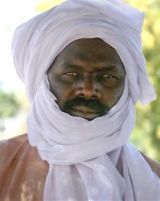Rebel JEM threatens to boycott Darfur talks
October 6, 2007 (KHARTOUM) — Darfur rebel leader Khalil Ibrahim said on Saturday he would not attend peace talks in Libya this month if more than two rival rebel groups are invited, casting further doubts over the peace process.

“The AU and U.N. mediation until now have failed to detail very precisely who will be invited to the peace talks,” he said, adding that only one delegation from JEM and one from the Sudan Liberation Movement (SLM) should be allowed to attend.
“If the mediation fails to take this decision by Oct. 27 then JEM is not attending the peace talks,” he said.
“We don’t want to start with chaos.”
Previous peace talks were marred by rebel divisions.
Only one of three negotiating insurgent factions signed the 2006 peace deal, which has seen little implementation as violence has spiralled. Since then, the rebels have split into more than a dozen rival groups.
Ibrahim also said the SLM had to “reform itself and make one delegation and one position”.
International experts estimate some 200,000 have died and 2.5 million driven from their homes since mostly non-Arab rebels took up arms in early 2003.
Ibrahim’s threat to boycott the peace talks came a week after AU peacekeepers suffered their worst attack, with 10 soldiers killed and almost a dozen wounded.
Their base in Haskanita town in southeast Darfur was overrun, burnt and looted in an attack blamed on suspected rebel factions, although they have denied involvement.
SLM founder and chairman Abdel Wahed Mohamed el-Nur has said he will not attend talks until a U.N. force is deployed to stem the violence in Darfur and pro-government militias are disarmed.
He also criticised the mediation’s choice of venue, saying the rebels were not consulted and a more neutral country should have been chosen.
“Even if we were to attend the negotiations it will not be Tripoli,” he said. “We think that any negotiation is supposed to happen in a place which is not related to the conflict.”
Neighbouring Libya was a key player in the Darfur conflict. Observers say Tripoli armed and supported rebels and interfered in previous peace efforts.
The International Criminal Court (ICC) has issued arrest warrants for a junior government minister and an allied militia leader accused of war crimes.
Khartoum says the West has exaggerated the conflict and refuses to hand over the suspected war criminals.
Delays in deploying a 26,000-strong U.N.-AU joint force to absorb the struggling AU peacekeepers have been delayed by a lack of pledges from nations with enough skilled and equipped soldiers.
Khartoum and the AU have rejected non-African troops, U.N. officials say.
(Reuters)
